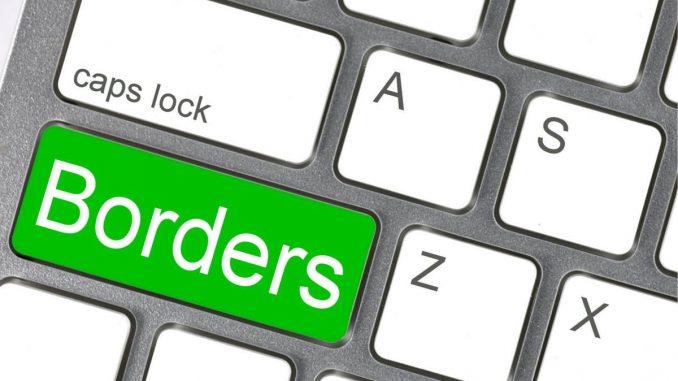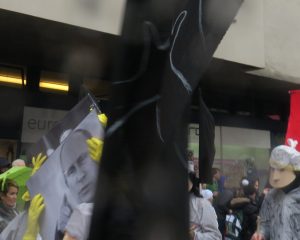
The moderation of the content of Internet communications is the most contentious issue arising from the regulation of the Internet in countries around the world. These controversies focus mainly on the conflict between freedom of expression and the regulation of restrictions on freedom. The Internet is considered to be the ideal way and means of achieving freedom of expression. Regulating the content of online communications would undoubtedly conflict with the idea of freedom of expression. This involves a conflict between freedom and regulation, and the reconciliation of the commercial interests of Internet service providers with the public interest. In addition, there are many difficulties in the process of content review and control, mainly in the implementation of control technology, laws and regulations. The popularity of the Internet has liberated the productivity of Internet content, and while it has brought convenience to people, it has also brought a series of misconducts in information dissemination, such as the proliferation of fake news and violent crime. The necessity for content moderation on the Internet is becoming increasingly evident.
Issues arising from internet platforms
In the 1930s, with the development of media technology and a combination of political, economic, and cultural factors, the media played an increasingly important role in social life and the public became increasingly dependent on them.
Several changes in the media industry at this time put it in great crisis:
– Firstly, the growing and widespread abuse of the press in the pursuit of commercial profit or political power.
– Secondly, the concentration of ownership of the media in capitalist groups made the “free market of ideas” has become an extravagant dream.

https://creativecommons.org/licenses/by/2.0/
A plethora of concerns has been raised, particularly since the 2016 US elections, about platform involvement in the spread of ‘fake news’ and the alleged manipulation of electoral politics (Flew et al., 2019, p.34). According to Business Insider in 2016, many Americans believe that fake news on Facebook has influenced people’s judgment in the US election. Such views suggest that Facebook now has an important role in information distribution. Most active users are likely to be more likely to watch news shared by friends on Facebook than read traditional news sites. However, Facebook users are often poor at distinguishing whether the news is true or false. Therefore, when false information is viewed multiple times, it can hurt public opinion.
Digital platforms’ attempts and controversies for Internet content moderation
Content moderation on the Internet requires the collaboration of multiple governance actors to control behavior that causes undesirable consequences on the Internet and to create a healthy Internet environment. There are several main tools used to control content: cyber legislation, technical tools, industry self-regulation, international cooperation, and administrative intervention. The combined effect of these means of control has resulted in a relatively comprehensive system of Internet content control. The key outstanding challenges of media regulation in the digital age arise from the complexity of regulating in a contested global arena where national policies are often in conflict and laws are not always enforceable in a straightforward way (Flew et al., 2019, p.42). The voluntary program’s approach to content review is therefore advocated in many countries, creating a more relaxed environment for the development of the Internet. The digital platforms determine their regulations and codes of conduct according to their situation and work together to ensure the order of the Internet by consciously observing and monitoring these guidelines. This is achieved through self-censorship of content by various actors such as trade associations, content providers, and service providers. Established research suggests that voluntary programs do have an effect and can be used to supplement traditional regulation and offset its high implementation costs (Potoski & Prakash, 2005). For example, internet service providers such as Google, Yahoo, and Microsoft have implemented self-censorship of their online services, particularly for the international versions of their online services, to try to avoid a situation where undesirable information is disseminated.
YouTube has been working hard to ban excessively violent videos, but the problem of violent videos has not been curbed more effectively. Platforms have also been heavily criticized for failing to reduce online hate speech, abuse, and harassment or to stem the promotion of terrorism (Flew et al., 2019, p.34). On 7 November 2007, nine people were killed in a school shooting committed by a Finnish high school student after he posted a trailer of the shooting on YouTube. YouTube has also been repeatedly accused of being a tool for gangs to show off their force and provoke each other. Some gangs have posted videos on the site provoking another gang, leading to subsequent violence. In September 2008, YouTube announced a ban on uploading videos that promote violence and post threats with images of weapons. The UK branch of YouTube will be the first to enforce this rule by blocking videos content about displaying weapons to make threats. In February 2010, YouTube added a restricted mode feature, which can be activated to filter potentially offensive videos or strings, including pornography, violence, or war. This feature is claimed to protect children or teenagers from objectionable content, based on feedback from many users, the restricted mode does not prevent children in the home from accessing unfiltered YouTube content using other browsers, and in most cases, it still loads age-restricted content.
Liberal theory and government moderation
The liberal theory of the media was gradually developed during the struggle for freedom of the press in Western countries. John Milton published his work Areopagitica in 1644 —
“the liberty to know, to utter, and to argue freely according to conscience, above all liberties.”
This laid the foundations of the liberal media system in the seventeenth century as the core of Milton’s thought. By the eighteenth and nineteenth centuries, the Western bourgeois liberal idea of freedom of speech and publication was concretely developed and put into practice. Of course, liberals also saw several difficulties that this theory needed to face. Firstly, they recognized the fact that the state was involved in the communication process through various institutions, but they believed that the less the government was involved the better. The state role, when compared with traditional command-and-control legislation, is relatively limited to more of an informal oversight and steering role (Gorwa, 2019, p.10). The extent to which the government can be involved in the communication process then becomes a constant dilemma. They then argue that freedom of expression is not absolute but has limits, and so the question of how to define the media’s freedom of expression and the limits of media oversight of government also becomes problematic. These dilemmas arise from a potentially huge flaw in liberal supremacy: it does not provide a precise standard for the day-to-day functioning of the media – in short, a fixed criterion for distinguishing between freedom and abuse of freedom. It is vague, indeterminate, and sometimes inconsistent (Siebert et al., 1956, p.60). The advent of the Internet has constituted a virtual world that is very different from the real world. In this virtual world, there is considerable doubt as to whether traditional law applies to the Internet. As things stand now, the Internet is not a virtual space completely detached from the real world, it is not a blind spot for legal regulation, and all traditional laws and regulations applicable in the real world are equally applicable to the Internet. At the same time, however, traditional laws must be adapted to the new phenomena brought about by the Internet. Therefore, the legal regulation of Internet content relies mainly on the relevant provisions of the traditional laws of the real world, while new phenomena that cannot be regulated on the Internet are regulated by the enactment and implementation of special Internet laws and regulations.
Conclusion
Compared to traditional media such as newspapers, radio, and television, the content disseminated on the Internet is more difficult to control, mainly due to its virtual, cross-border nature and the huge amount of information available. There is no single way to effectively tackle the vast array of problems and negative effects that arise on the internet. Effective control of Internet content can only be achieved through the close cooperation of several institutions and the use of a variety of different control methods.
Reference list
- Siebert, F. S. (Fred S., Peterson, T., & Schramm, W. (1956). Four theories of the press : the authoritarian, libertarian, social responsibility and Soviet communist concepts of what the press should be and do . University of Illinois Press.
- Milton, J. (1644). Areopagitica; A speech of john milton; for the liberty of vnlicenc’d printing .London: Retrieved from http://ezproxy.library.usyd.edu.au/login?url=https://www.proquest.com/books/areopagitica-speech-john-milton-liberty-vnlicencd/docview/2138580325/se-2?accountid=14757
- Flew, T., Martin, F., & Suzor, N. (2019). Internet regulation as media policy: Rethinking the question of digital communication platform governance. Journal of Digital Media & Policy, 10(1), 33–50. Retrieved from https://doi.org/10.1386/jdmp.10.1.33_1
- Gorwa, R. (2019). The platform governance triangle: Conceptualising the informal regulation of online content. Internet Policy Review, 8(2). Retrieved from https://doi.org/10.14763/2019.2.1407
- Owen Gibson. (2008, Sep 18). YouTube curbs videos fueling gang violence. The Guardian. Retrieved from https://www.theguardian.com/technology/2008/sep/18/youtube.google
- Salem-News. (2007, Nov 07). 7 Kids, Principal Killed During High School Shooting in Finland. Retrieved from http://www.salemnews.com/articles/november072007/finland_school_shooting_folo_110707.php
- Alyson Shontell. (2016, Nov 12). Facebook is being blamed for Trump’s election – but Mark Zuckerberg’s response is tone deaf. Insider. Retrieved from https://www.businessinsider.com/facebook-blamed-trump-election-mark-zuckerberg-response-tone-deaf-2016-11
- YouTube Viewers. (2018. Jul 28). How to turn Restricted Mode on and off [Video file]. Retrieved from https://www.youtube.com/watch?v=dtQat5HNYrI

